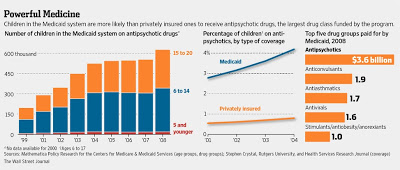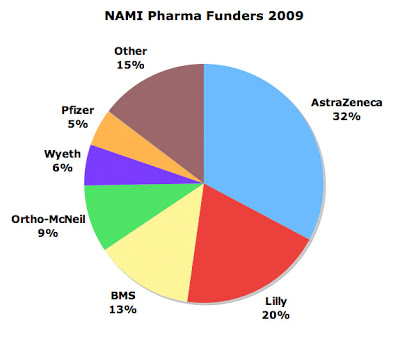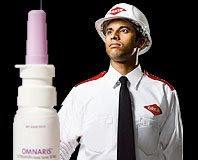As reported in the Wall Street Journal (here):
“Federal health officials have launched a probe into the use of antipsychotic drugs on children in the Medicaid system, amid concern that the medications are being prescribed too often to treat behavioral problems in the very young.
“The effort applies to a newer class of antipsychotic drugs known as “atypicals,” which include Abilify, the nation’s No. 1 prescription drug by sales. The drugs were originally developed to treat psychoses such as schizophrenia, but some now have Food and Drug Administration approval for treatment of children with conditions such as bipolar disorder and irritability associated with autism.
“Medicaid spends more on antipsychotics than on any other class of drugs. Abilify, made by Otsuka Pharmaceutical Co., appears on lists of the top 10 drugs paid for by Medicaid in various states.
“Children on Medicaid are prescribed antipsychotics at four times the rate of privately insured children, according to a study by Stephen Crystal, a professor of health policy at Rutgers University, that looked at data from 2004 on 6- to 17-year-old children in seven states” (find the report attached to this post).
Meanwhile, major anti-psychotic drug marketers contribute to mental health advocacy groups such as the National Alliance on Mental Illness (NAMI) and have paid enormous settlements to the DOJ for illegally marketing antipsychotics.
The biggest pharma NAMI funder in 2009 was AstraZenca (AZ), which donated $1,255,000.00. Recall that AZ is forced to pay about 400X that amount ($520 million) to resolve allegations that it illegally marketed the anti-psychotic drug Seroquel for uses not approved as safe and effective by the Food and Drug Administration (see HHS press release here).
Lilly was next on the list having donated $750,500.00 to NAMI in 2009. Recall that Lilly markets Cymbalta and that it recently received a warning letter from the FDA about misleading a Cymablta print ad — ie, re: “omission of risk information.” Cymbalta is indicated for treatment of depression among many other things these days (see “The Cymbalta Buzz Machine is at Full Throttle!“).
The third biggest NAMI pharma “funder” for 2009 was BMS, which donated $506,250.00. Recall that BMS markets the drug Abilify for bipolar disorder. Some time ago, Andy Behrman — BMS’s patient spokesperson for Abilify — went on a campaign against the very product he endorsed for money (see “Andy Behrman, Now an Anti-BMS Spokesperson, Says ‘Ask Your Doctor If Abilify is Wrong for You’“).
These numbers are from 2009 and the Rutger’s and Medicaid data only cover the years prior to 2009. I wonder, therefore, if the number of Medicaid children on antipsychotic drugs has skyrocketed further in the 4 since then?










![6 Digital Tools at the Center of Healthcare Digitalization [INFOGRAPHIC]](http://ec2-54-175-84-28.compute-1.amazonaws.com/pharma-mkting.com/wp-content/uploads/2021/04/6DigitalTools_600px-100x70.jpg)




